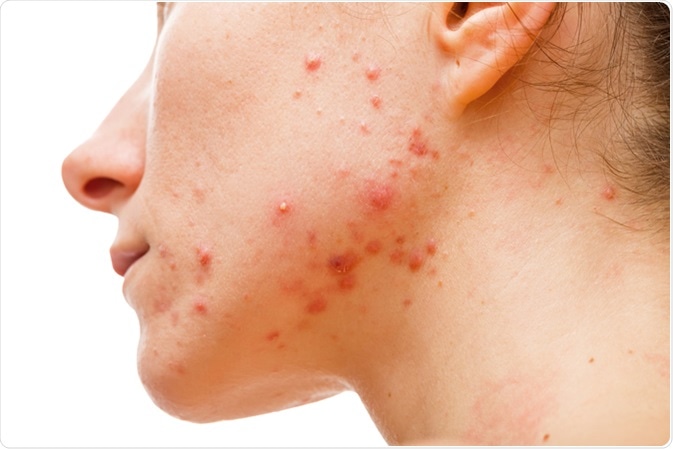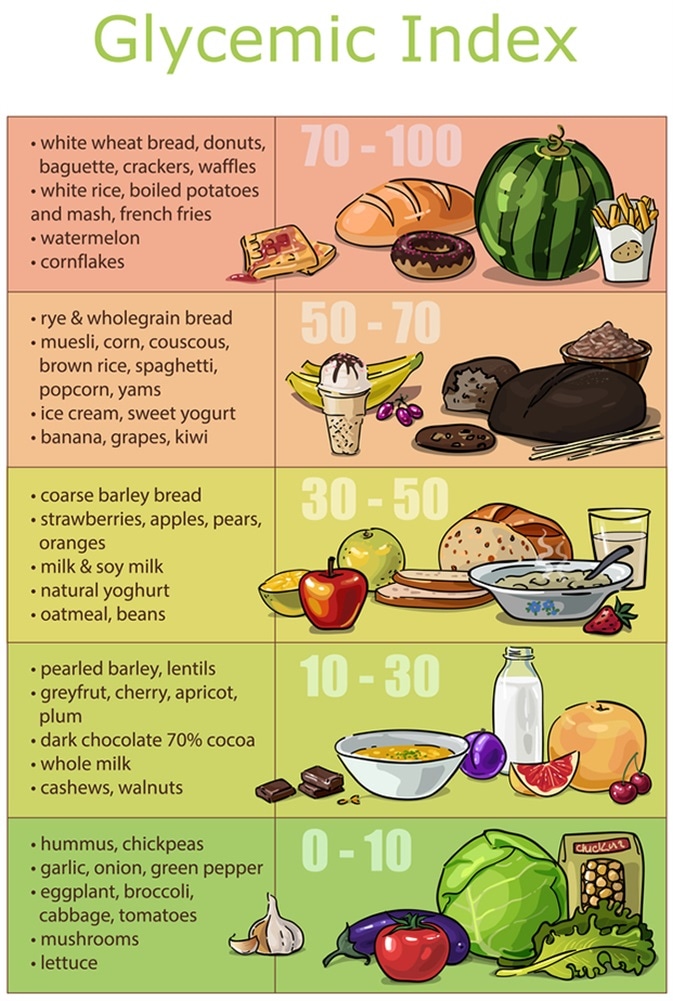Acne is a common skin condition which affects 80% of teenagers and one-fifth of adults in America. Although acne is known to be associated primarily with hormonal changes, research has also shown that diet can affect acne severity.
What is Acne?
Acne is a common skin condition of varying severity from mild to moderate and severe. Many people experience acne during their lifetime. It typically affects the face, back, and chest and is characterized by the production of oily skin and spots. Mild cases can often be treated by over-the-counter medicine, whereas more serious cases may require a combination of prescribed oral antibiotics and topical ointments.

Acne skin. Image Credit: Ocskay Bence / Shutterstock
What Causes Acne?
The surface of the skin is populated with sebaceous glands, which are attached to hair follicles. Typically, the glands produce a lubricant called sebum to prevent the skin from drying out. Hormonal changes can increase the amounts of oil produced. This increased oil, in combination with dead skin cells, can block follicles and result in the typical spotting.
 Types of acne. Image Credit: Timonina / Shutterstock
Types of acne. Image Credit: Timonina / Shutterstock
Diet Do’s
Research has shown that several foods are associated with a clearer complexion.
Low Glycemic Load
Eastern Asian diets tend to be comprised of low glycemic foods that are also lower in fat. Prior to the introduction of westernized diets that include fast food, persons of East Asian descent tended to have fewer reported causes of acne. The glycemic index (GI) of a food is the number obtained when the glycemic response for an equal quantity of reference carbohydrate (such as white bread) is divided by 100. The glycemic load (GL) refers to the quantity and quality of dietary carbohydrate per serving. Diets with high GLs may trigger acute hyperinsulinemia, which is linked to sebum secretion.
Furthermore, research has shown that low GL diets are associated with reduced acne severity. It has been suggested that low GL diets may increase the ratio of monounsaturated to saturated fatty acids in skin surface triglycerides, which leads to fewer acne lesions. Based on this research, consumption of foods with lower GLs, such as fruit, porridge, and lentils, may be advisable for those with acne.

Glycemic index foods. Image Credit: Irina Izograf / Shutterstock
Vegetables
The consumption of vegetables, particularly non-starchy leafy ones is well-known to confer many health benefits. Research shows that people who consume vegetables regularly are less likely to develop severe acne.
Foods Containing Zinc
Zinc is a micronutrient that plays a significant role in many bodily processes and is thought to influence skin conditions. Research has shown that persons with low zinc levels are more likely to have severe acne. Thus, regular consumption of foods rich in zinc (such as lentils and cashew nuts) may benefit persons wanting to prevent or treat acne.
Diet Don’ts
Several foods are associated with increased acne severity.
Dairy Products
Much research points to consumption of dairy products (such as cream cheese and cottage cheese) as aggravating acne. The intake of milk and milk-based products may increase circulating androgens, which in turn increase sebum synthesis. One study showed that weekly ice cream consumption was associated with a 4-fold increased the likelihood of having acne.
Fast Food
Research comparing the dietary profiles of teenagers with and without acne found that regular intake of junk food such as hamburgers and fried chicken was significantly higher in those with acne. Therefore, it is suggested that those with the skin condition avoid consuming such foods.
Whey Protein Powder
Those with acne who enjoy weight training and use protein powders to increase muscle growth may experiencing worsening of their acne. Research has found that athletes who regularly consume whey protein experienced induced acne flare-ups. As whey is a protein sourced from cow milk, it is thought to promote sebum production.
Despite much research, controversy remains surrounding the link between diet and acne. Some researchers argue that there is no relationship, whereas others state that diet-induced hyperinsulinemia can trigger the development of this condition. To add to the debate, many people self-report that certain foods aggravate their acne. Whatever the impact, adhering to a low glycemic index and low fat diet provides many health benefits.
Further Reading
Last Updated: Nov 26, 2018